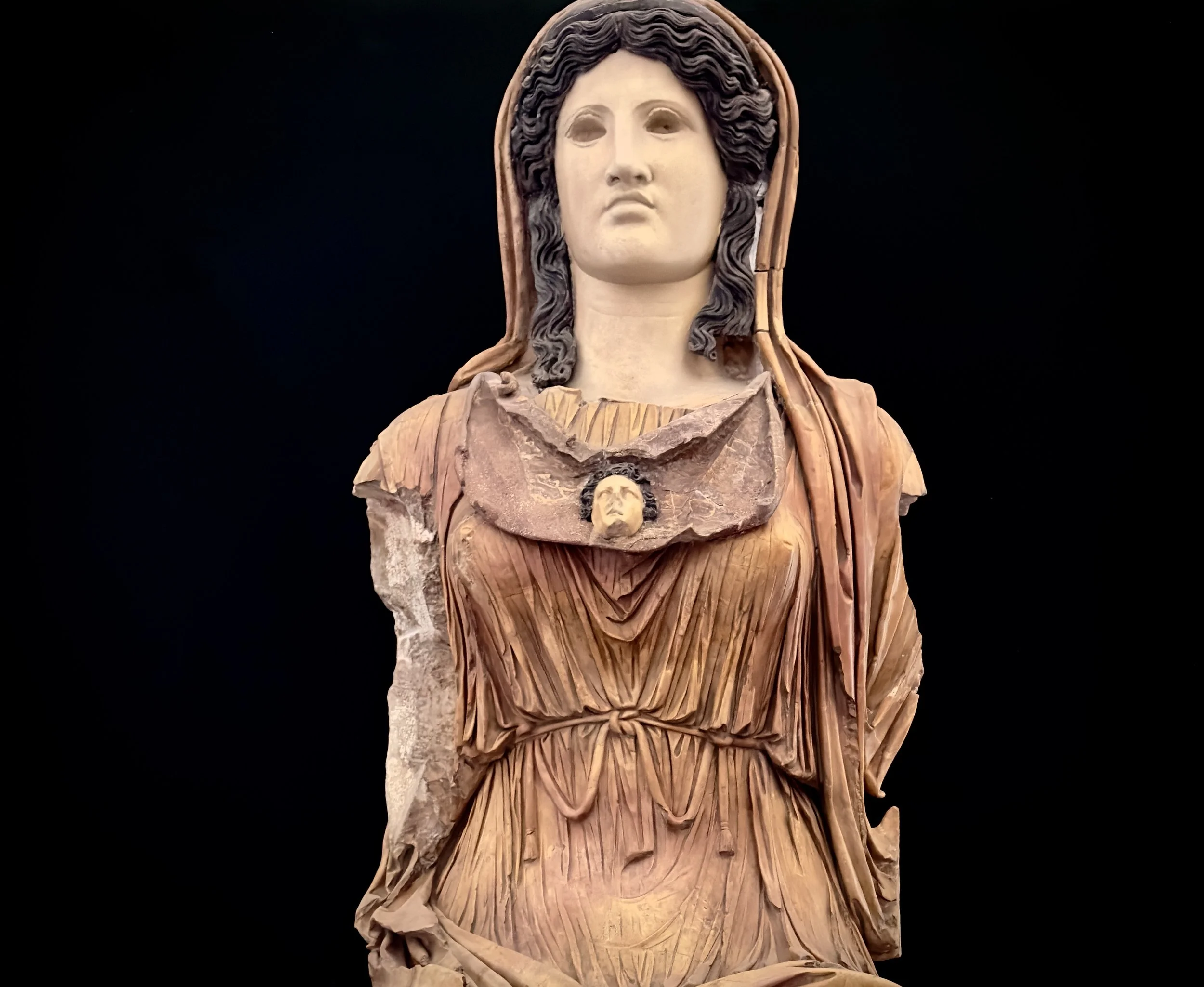NOTABLE WOMEN OF ANCIENT ROME
Rome’s powerful women were inspired by powerful female gods. This statue of the goddess Minerva from approximately the 5th century BC was likely used in a temple.
It’s true that women in ancient Rome were subservient to men and lacked voting rights. Nevertheless, they had considerably more freedom than the women of Athens. Roman women could go out unaccompanied, own their own businesses, and in certain cases, inherit property. They could also wield enormous political influence. Below are some of the most famous women of ancient Rome.
- The Sabine Women. After Romulus founded Rome, so the legend goes, he invited reprobates of the world to populate his city. Exiles, criminals and thugs flocked there in droves. However, very few women came. Romulus appealed to neighboring tribes for wives, but they refused, citing the riffraff who would dishonor their daughters. So, Romulus resorted to deception. He invited his neighbors to a religious festival. They came with their daughters in tow. On a signal, however, the Romans abducted these women and dragged them back to Rome. This is known as the Rape of the Sabine Women. And while rape nominally means ‘seizure’ here, let’s not pretend the other meaning doesn’t apply. The tribes duly declared war on Rome. After a series of battles, the abducted women placed themselves directly between the warring factions. They appealed to both sides to end the war. By this point the women had married their abductors and began bearing children. They didn’t want their fathers and brothers killing their husbands and depriving their sons of fathers. The opposing sides soon came to peace as a result. While this doesn’t say much for women’s rights, it does provide a prime example of the power women could wield in Rome.
Matteo Ponzone’s “Tarquin and Lucrezia” (1650)
- Lucretia. In the time of the monarchy, some military buddies were competing to see who had the most virtuous wife. After several libations, they decided to go check on these women. Most found their wives gossiping or partying, but one soldier’s wife, Lucretia, was at home weaving. This was among the most noble things a wife could do. Another soldier – the son of the king – decided he must have her. He went back and tried to force himself on her. She resisted, but he threatened to kill her and a male slave and place them in bed together. This would have so dishonored Lucretia that she relented. After the prince left, she immediately summoned her husband and told him what happened. He tried to assure her it wasn’t her fault, but Lucretia said she didn’t want any woman to ever use that excuse, and promptly committed suicide to protect her honor. This act sparked the revolution that would overthrow the monarchy and usher in the republic. Again, not very forward-thinking in terms of women’s self-perception, but another example of female influence on the ancient city.
The catchily-titled “Coriolanus’s Wife and Mother Beg Him to Spare Rome” by the pithily named Gerbrand van den Eeckout (1674)
- Volumnia. Coriolanus was a successful military officer in the time of the kings. But he was convicted by the plebeians after denying they had a right to grain rations. He was disgraced and exiled. Hellbent on revenge, he offered his considerable services to a warring tribe, the Volscians. As he prepared to attack Rome with his new army, his mother Volumnia approached him and with a moving speech, begged him not to. This shamed him to the point he withdrew. He was later killed by the Volscians who distrusted his allegiance. And with good reason, it seems. Roman mothers wielded enormous influence over their sons, and in the end, the fearsome Coriolanus was just a momma’s boy.
- The Vestal Virgins. Among the most powerful women in Rome were the priestesses of Vesta, the goddess of the hearth and family. They were tasked with maintaining the sacred flame along with other rituals to ensure the goddess’s continued favor. It was thought that Rome would be destroyed if this deity wasn’t constantly appeased. The Vestal Virgins were selected by lot from among a group of patrician girls, usually around ages 8-10. They served for 30 years. The first 10 were for training, the middle ten for executing their duties, the final ten for training the next generation. They were free to marry upon their release, but few did. The requirement to remain chaste was strict. Any Vestal found guilty of violating this oath was buried alive. But the Vestals also had great privilege. They had front-row seats to all events and could own property in their own right. They also had remarkable power of clemency. If a convicted criminal crossed their path, they could issue a pardon on the spot. Their handlers chose routes to avoid encountering these criminals, but the Vestals enjoyed wielding this power and would often demand their litters be carried along alternative paths.
“When Claudius Is Away, Messalina Will Play” by A. Pigma (1911). Or, as I like to call it, Gettin’ Messy with Messalina.
- Messalina. Not all Roman women were as virtuous as the previous examples. Messalina was the 3rd wife of the emperor Claudius. Ancient sources, probably unreliably, depict her as scheming and nymphomaniacal. She tried several times, unsuccessfully, to assassinate the young Nero, whom she viewed as a rival to her own son as a successor to Claudius. She was said to engage in prostitution and once won a contest with a local prostitute to see who could lie with the most men in a 24-hour period. Her most shocking act, though, was marrying a senator while her husband Claudius was out of the city. She did this in a very public ceremony with no attempt to cover it up. She may have been convinced by her new husband that Claudius would be overthrown, or perhaps she was simply unhinged, if it even happened. Whatever the reason, once Claudius found out, after much internal debate he ordered her execution.
Livia popularized many hairstyles, including this one, during her several decades as empress.
- Livia. As with Messalina, we can’t always trust the ancient sources. Extant writings come exclusively from aristocratic men, many of whom were misogynists and enjoyed peddling scandal. Livia Drusilla, the wife of the emperor Augustus, may be one such victim of their pens. She was said to have ordered the poisoning of all of Augustus’ potential successors so that her son from a previous marriage, Tiberius, would succeed her husband. Augustus did have terrible luck in this regard. His nephew Marcellus and his two grandsons, Lucius and Gaius, all died before age 40 under mysterious circumstances. Eventually Tiberius was his only choice and succeeded to the emperorship upon Augustus’ death. Regardless of whether Livia really set these murders into motion, she was an incredibly influential partner in rule with her husband. She was the very model of a virtuous Roman woman. Augustus was known to run policy by her and dedicated his Ara Pacis – the still-visitable temple of peace dedicated to the Pax Romana – on her birthday. She appeared on coins and her statuary occupied every corner of the empire. She lived well into her 80s. Her great-grandson Caligula succeeded Tiberius and refused to deify her upon her death. She was said to have agreed with her son Tiberius’ assessment of the notorious emperor: “I am rearing a viper for the Roman people.” But Caligula’s successor, Livia’s grandson Claudius, would deify her, even though she had treated him harshly on account of his disabilities which included a limp and a stutter. Being the grandson of a goddesses had its benefits, however.
Women not only had a tremendous influence on Rome, but they’ve also had a tremendous influence on me. Whether sisters, aunts, grandmothers, friends, teachers or co-workers, I’m so fortunate to have had strong, amazing, brilliant, funny, caring women in my life. And my mother, of course, stands out. As many of you know, she passed away last year. She was always fascinated with Roman history and regretted that she never got to visit. So, not only is my trip to expand on my covid quarantine-inspired deep dive into Roman history, it’s also in honor of her. She was my rock.
Te amo, mater. Hoc est tibi. ❤️
My brave mother and her future gladiator Senator blogger.







